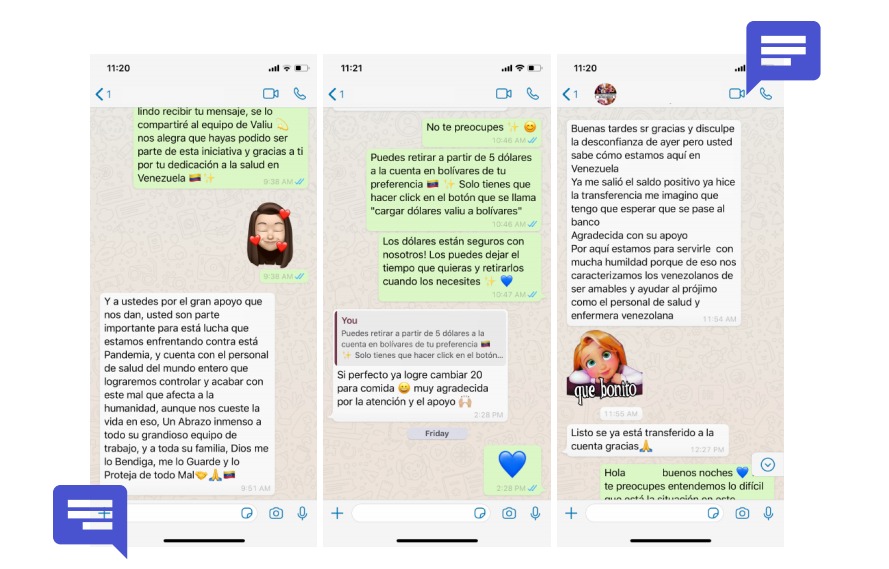Valiu Wants to Help Nurses Survive The Pandemic
A crowdfunding campaign has successfully achieved the goal of their pilot program: help 100 doctors and nurses with a $100 contribution during the pandemic. Now Valiu wants to reach all nurses fighting COVID-19 in Mérida, and they need our help.


It's making a huge difference.
Photo: OCHA/Gema Cortes
When Aurimar Rangel started working as a nurse three years ago at Nuestra Señora del Rosario Hospital in Zulia State, she wasn’t afraid of the many reports of doctors and patients that highlighted how broken Venezuela’s public health system was. She was in love with her profession, and wanted to work and help people the best way she knew how: caring for patients during their most vulnerable moment. But with the arrival of the pandemic, Aurimar’s workplace changed: “Since 2017, everything has changed. We’re one of the countries with more deaths of healthcare staff due to COVID-19. No one had ever seen a virus like this, and the hospital, also a sentinel center that takes patients with coronavirus, has never been more unequipped to handle a crisis: lack of staff, no supplies, intermittent basic services and fear are part of our daily lives now.”
Aurimar takes her time listing all the things she had when she started working as a nurse that she doesn’t have now: a room for medical staff to rest, a kitchen to cook during breaks, access to gasoline and a salary that could at least help her to buy food for herself and her son. “We’ve been working under difficult circumstances for a long time, but the pandemic exposed us all. Now, lack of supplies could have an effect on our health and our life; and even though the risks are huge, our salary is one of our biggest problems”.
Aurimar’s monthly salary is $1.6, but she still refuses to leave the hospital, especially during the coronavirus pandemic. She says it’s all a matter of vocation, love, and worry for her patients and her community in Barrio San José.
Her situation was critical, until a doctor recommended a new pilot program and asked her to enroll: it was an ongoing campaign that aimed at helping 100 doctors and nurses with $100 a month. She was one of the first ten people in the trial, which benefited with a contribution as a precedent exploration for the project, with funds recollected by a group of friends and private investors. Valiu is the application, and their social project sends previously selected medical staff $100 a month, which they can transfer to their account in bolivars within an hour of requesting it. “The contribution has been fundamental for us to handle the pandemic: it has helped us buy food for our families; but it has also helped us buy some of the medical supplies we need,” Aurimar says without doubt.

Direct and clear communication, in a “personalized attentiont” kind of treatment.
Photo: Valiu Team
The direct cash transfers program at Valiu started in May, and has been led by Alejandro Machado, Sara Cadena and Alberto Niego. They worked with local partners to select 100 beneficiaries, 94 out of which received $100, and cashed out an average of $62.10 during the first week. “When we made the first round of interviews to nurses, we realized that most of them were very devout to their work, and they had their minds set on helping others,” says Sara Cadena, Valiu’s design strategist, “Valiu wants for Venezuelans in Latin America to have more reliable access to dollars, and we are focused in making remittances easier to transfer. From this project, we decided to create Valiu.org, as a social impact project to complement the business strategy. After the pilot, we decided to raise funds for nurses working in the Autonomous Institute University Hospital of Los Andes, where we expect to start sending money to over 88 nurses from the COVID-19 emergency area.” Cadena also explains that this project is helping them determine the business model and social approach they will have in the future: “The project’s funds now come from private and open donations, but we want to grow. We’re still in a learning process to figure out whether the crowdfunding methodology will be the most sustainable way to approach this kind of social project we have in mind.”
Valiu’s team found that among the most frequent questions from the users were if they could use the entire amount personally, as some of them had been told by local political leaders that they had to share it after arrival. Some also thought that they had to cash it out all at once, or they’d lose it. Most beneficiaries used the money to buy food, medicine, and medical supplies for their work.
The crowdfunding campaign is still open, and the team is actively looking for donors to reach their $15,000 goal.
“As nurses in Venezuela, we need so much to start working in a safe environment during the pandemic. But this support has been invaluable. It has helped us support our families and work in better conditions,” says Aurimar, hoping for the project to grow and continue to help others working in critical conditions.
If you wish to help Venezuelan medical staff at emergency COVID-19 departments, already working in critical conditions, here’s the link to donate and share.
Caracas Chronicles is 100% reader-supported.
We’ve been able to hang on for 21 years in one of the craziest media landscapes in the world. We’ve seen different media outlets in Venezuela (and abroad) closing shop, something we’re looking to avoid at all costs. Your collaboration goes a long way in helping us weather the storm.
Donate



